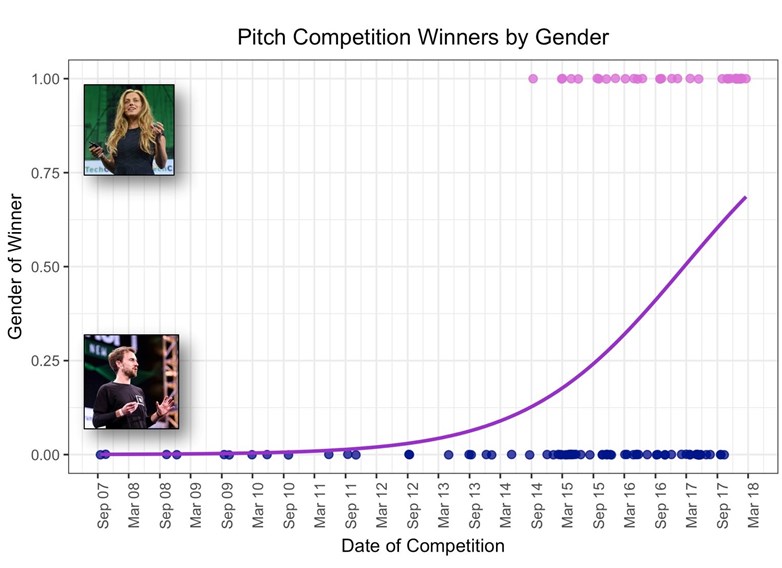Moral licensing and venture capital
Data and Experiments
A psychological phenomenon known as moral licensing, "when doing good frees us to be bad” may impact the venture funding landscape for tech startups. An archival study reveals that female startup founders are winning increasingly more high-visibility pitch competitions (such as TechCrunch Disrupt) as attention to the gender funding gap also rises.
Meanwhile, these female entrepreneurs raise less funding than men by an enormous margin. Perhaps investors who judge pitch competitions publicly signal their purported (or sincere) egalitarian values, but later in less visible daily operations, they revert to industry norms and continue to avoid investing in female entrepreneurs. We consulted archival records of every TechCrunch venture capital pitch competition and captured dozens of variables to construct a massive dataset that reveals characteristics of pitch winners, finalists, and their funding and operating outcomes. We pair this observational data with experiments where we manipulate moral credentials – whether or not investors have the opportunity to signal egalitarian values. The hypothesis is that once credentialed, investors return to entrenched biased attitudes against female entrepreneurs, evidenced by allocating less funding towards female-led startups whose firms are identical along several key dimensions to male-led firms. This application of moral licensing explains how even egalitarian behaviors can perpetuate bias in venture capital.
Planned Outcomes
We continue to train startup entrepreneurs how to signal appropriate motivational orientations during pitch competitions and the following Q&A rounds. Investors also adjust their Q&A style in order to decipher the best entrepreneurs to invest in. The results of this moral licensing research may further define the role of pitch competitions in venture capital, which we aim to publish in an academic journal and a practitioner outlet.
Collaborator
Dana Kanze of is an integral part of this research. Dana studies organizational behavior in the management department at Columbia Business School. She has published in the Academy of Management Journal, and multiple practitioner articles in the Harvard Business Review
Get involved!
If you are an entrepreneur, an Angel Investor, or you work in Venture Capital, contact us to learn more about this project as well as other exciting research.
